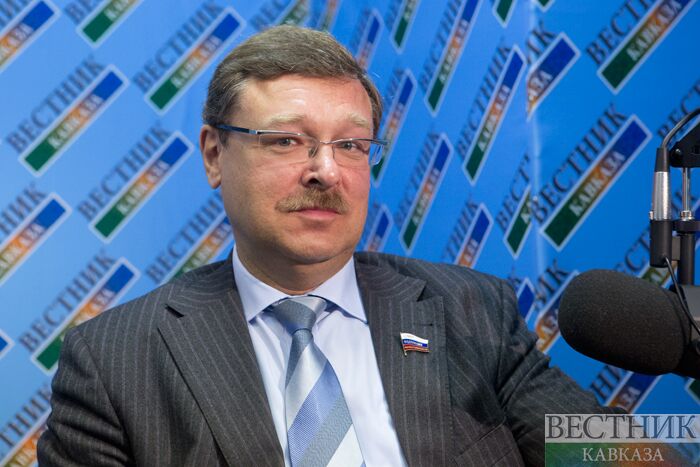Yesterday, the Executive Council of the Organisation for the Prohibition of Chemical Weapons voted against the Russian and Iranian proposal on investigation of a suspected chemical weapons incident on April 4 in the Syrian town of Khan Shaykhun, located in the province of Idlib. Moscow said that the states that voted against the proposals of Moscow and Tehran complicated the search for ways out of the Syrian crisis, but it is still possible to agree on conducting a serious investigation of the alleged chemical weapons incident.
The Russian Foreign Ministry believes that to be truly credible, an investigation must meet at least three criteria: the investigative actions must be carried out directly onsite at Khan Sheikhun and Shayrat airbase; it is important to ensure a geographically balanced investigative team of investigators; the investigations cannot be based mainly on using online materials and polling opposition members.
The chairman of the Federation Council’s Foreign Affairs committee, Konstantin Kosachev, is convinced that the situation in Syria and Russia's actions to assist the Syrian authorities in establishing constitutional order and overcoming the theoretical threat are in dire need of objective and quality information support and, of course, tight parliamentary control: "This is about the fate of a sovereign country, which, unfortunately, is experiencing a severe internal crisis. The crisis that has been developing for the seventh year before our eyes, was largely provoked from outside by the consistent line of the group of both regional and western states, in order to influence the fate of government in this country and displace the incumbent President Bashar al-Assad. As a result of this grave crisis, the situation in the country got out of control, what was used by the terrorist groups that had previously settled in neighboring Iraq and Libya. Syria's fate depends on the extent to which the society will be consolidated, the extent to which the Syrian society will be able to return to the path of a political settlement of the crisis".

According to Konstantin Kosachev, in this sense, much depends on neighboring countries, including Egypt: "Egypt is involved in the Syrian situation, if only because many Syrian refugees are on Egyptian territory, and certain opposition groups organize their activities in Egypt. There is a concept of the Cairo platform, along with the Riyadh platform, the Moscow platform and many other platforms. Participants in the Syrian settlement process in Geneva, in Astana (Russia, Iran and Turkey) are trying to bring together the opposing sides".
However, according to Kosachev, the recent process of political settlement is fiercely resisted both inside Syria and abroad: "We see an increasing wave of terrorist acts, outright provocations, hasty actions of certain world powers. So, the US is trying to place any turns in the Syrian situation on the shoulders of the Syrian authorities, accusing them of all possible and impossible crimes and delinquencies. The last time it happened after the April 4 situation in the province of Idlib. It is the responsibility of experts to figure out who is responsible for this operation, whether it was real or staged, primarily those from the Organization for the Prohibition of Chemical Weapons. These specialists are not able to assume their functions and their mission, because their work is hampered by various political maneuvers in this organization. But any actions that could trigger a response to this tragedy should be based on the unbiased conclusions of the experts, and not on any geopolitical considerations that we saw in the actions of the US, which obviously moved beyond the limits of international law"
Recently, British Foreign Secretary Boris Johnson offered Russia a chance to be on the "right side of the argument" and join the coalition of Western countries to fight against ISIS (a terrorist organization banned in Russia).

However, the First Deputy Chairman of the Federation Council Committee on Foreign Affairs, Vladimir Dzhabarov, is convinced that Russia's entry to the coalition in Syria is only possible if it stands on a level playing field with the US: "A broad coalition would be an ideal solution, if there was no flagman represented by one country, like the United States in the current coalition. We must participate on the absolutely equal terms there. And most importantly, they should not consider the removal of Syrian President Bashar al-Assad. It is not viable. We will never agree on this".






